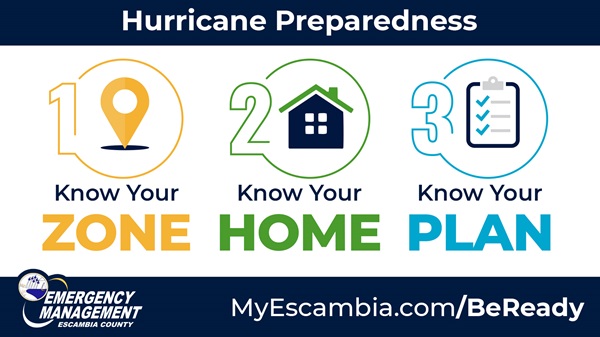
Search by Keyword
Search by Department
All Departments Administration Corrections Development Services Facilities Management Human Resources Information Technology Library Services Management and Budget Services Natural Resources Management Neighborhood and Human Services Parks and Recreation Public Safety Public Works Veterans Services Waste ServicesHurricane Preparedness Week 2024 is May 5-11. Escambia County Emergency Management encourages residents to take time during the week to prepare their homes for the upcoming hurricane season. The 2024 Atlantic hurricane season will take place between June 1-Nov. 30.
"This year, we want to put a specific emphasis on staying informed," said Emergency Manager Travis Tompkins. "By following our social media pages, you will be kept abreast of the latest disaster preparedness news, breaking national weather service events, and a host of other information that may impact you and your family. When you want to be in the know, follow us and stay informed."
Escambia County Emergency Management will be producing daily "A Minute with EM" videos throughout Hurricane Preparedness Week that focuses on the following topics:
Each "A Minute with EM" video can be viewed at MyEscambia.com/BeReady, and on Facebook, X (formally known as Twitter), Instagram and YouTube.
Follow these steps to make sure you and your family are prepared this hurricane season:
Know Your Zone. Familiarize yourself with evacuation zones and routes. In 2018, Emergency Management released a "Know Your Zone" website for residents to look up their evacuation zone. You can look up your address to see if your home is in evacuation zone A, B, C, D, E or none as well as view the impacts of storm surge in your neighborhood. Knowing your evacuation zone is one of the most important hurricane preparation steps you can take. It is very important that you look up your evacuation zone each year to find out if and when you should evacuate, even if you have looked it up in the past, as zones can change. Most importantly, don’t rely on previous storm experience.
Know Your Home. Is your home prepared for a hurricane? If you need to evacuate, pack an emergency supply kit. It should contain seven days of clothes, nonperishable food, pet food, water and a battery-operated radio and flashlight with extra batteries. Also include a first-aid kit with items such as gloves, adhesive bandages and prescription medications. Find a printable disaster shopping list here. Please remember "Get One Week Ready." Citizens should be equipped to provide for themselves, their families and their pets for at least three days following a major hurricane.
Know Your Plan. Plan how you will assemble your family and loved ones, and anticipate where you will go for different situations. Get together with your family and agree on the best ways to contact one another in an emergency. Inform out-of-town family and friends of your emergency plans and stay in contact. Plan your evacuation route and destination before an evacuation order is issued. Anticipate where you and your family will go for different situations. Be sure to make preparations for pets and family members who made need special accommodations, such as a wheelchair ramp, oxygen tank or specific medications. More information on planning an evacuation for a person with disabilities or special needs is available here.
Stay Informed. Know where to go for trusted sources of information during a hurricane event. Sign up for alerts from your local emergency management office so notifications, including evacuation orders, go directly to your phone and email. You can also enable emergency alerts on your cell phones. Monitor local news for hurricane watches and warnings in your area and follow directions of local officials. Make sure you have a battery-operated or hand-crank radio available should the power go out. Review and sign up for the different types of information/notifications available directly from Escambia County.
The National Weather Service also provided some steps to follow for Hurricane Preparedness Week:
Get an Insurance Checkup: Call your insurance company or agent and ask for an insurance check-up to make sure you have enough homeowners insurance to repair or even replace your home. Don’t forget coverage for your car or boat. Remember, standard homeowners insurance doesn’t cover flooding. Whether you’re a homeowner or renter, you’ll need a separate policy for it, and it’s available through your company, agent or the National Flood Insurance Program at floodsmart.gov. Act now as flood insurance requires a 30-day waiting period.
Additional online safety resources:


The mission of Escambia County government is to provide efficient, responsive services that enhance our quality of life, meet common needs and promote a safe and healthy community.
Under Florida law, IP addresses and both the content of emails and email addresses are public records. If you do not want your IP address and the content of your email or your email address released in response to a public records request, do not send electronic mail to this entity. Instead, contact this office by phone or in person.

